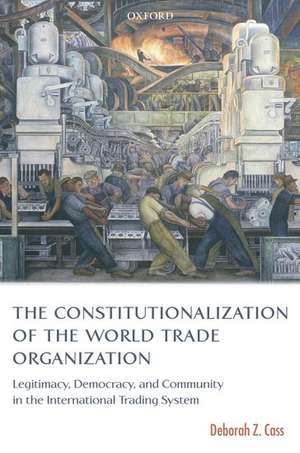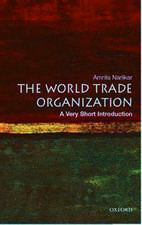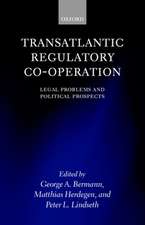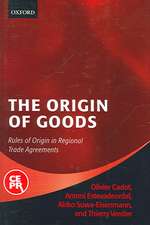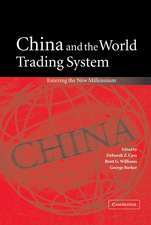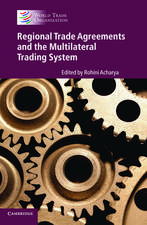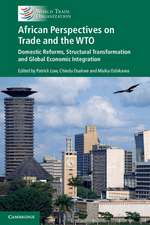The Constitutionalization of the World Trade Organization: Legitimacy, Democracy, and Community in the International Trading System: International Economic Law Series
Autor Deborah Z. Cassen Limba Engleză Paperback – 28 iul 2005
| Toate formatele și edițiile | Preț | Express |
|---|---|---|
| Paperback (1) | 310.34 lei 31-37 zile | |
| OUP OXFORD – 28 iul 2005 | 310.34 lei 31-37 zile | |
| Hardback (1) | 1023.19 lei 31-37 zile | |
| OUP OXFORD – 28 iul 2005 | 1023.19 lei 31-37 zile |
Din seria International Economic Law Series
- 26%
 Preț: 821.82 lei
Preț: 821.82 lei - 17%
 Preț: 942.70 lei
Preț: 942.70 lei - 30%
 Preț: 645.67 lei
Preț: 645.67 lei - 21%
 Preț: 591.77 lei
Preț: 591.77 lei - 30%
 Preț: 734.07 lei
Preț: 734.07 lei - 33%
 Preț: 544.87 lei
Preț: 544.87 lei - 21%
 Preț: 555.83 lei
Preț: 555.83 lei - 34%
 Preț: 1314.80 lei
Preț: 1314.80 lei - 21%
 Preț: 680.13 lei
Preț: 680.13 lei - 12%
 Preț: 331.20 lei
Preț: 331.20 lei - 15%
 Preț: 604.15 lei
Preț: 604.15 lei - 27%
 Preț: 420.04 lei
Preț: 420.04 lei - 34%
 Preț: 766.11 lei
Preț: 766.11 lei - 34%
 Preț: 1077.89 lei
Preț: 1077.89 lei - 26%
 Preț: 512.79 lei
Preț: 512.79 lei - 34%
 Preț: 494.80 lei
Preț: 494.80 lei - 34%
 Preț: 921.33 lei
Preț: 921.33 lei - 34%
 Preț: 838.53 lei
Preț: 838.53 lei - 34%
 Preț: 821.31 lei
Preț: 821.31 lei - 30%
 Preț: 659.82 lei
Preț: 659.82 lei - 30%
 Preț: 662.19 lei
Preț: 662.19 lei - 19%
 Preț: 261.30 lei
Preț: 261.30 lei - 18%
 Preț: 379.03 lei
Preț: 379.03 lei - 30%
 Preț: 604.20 lei
Preț: 604.20 lei - 34%
 Preț: 838.59 lei
Preț: 838.59 lei - 18%
 Preț: 678.31 lei
Preț: 678.31 lei - 8%
 Preț: 347.63 lei
Preț: 347.63 lei - 30%
 Preț: 577.50 lei
Preț: 577.50 lei - 18%
 Preț: 947.75 lei
Preț: 947.75 lei - 30%
 Preț: 794.49 lei
Preț: 794.49 lei - 30%
 Preț: 788.67 lei
Preț: 788.67 lei - 31%
 Preț: 817.03 lei
Preț: 817.03 lei - 30%
 Preț: 700.83 lei
Preț: 700.83 lei - 30%
 Preț: 703.78 lei
Preț: 703.78 lei - 30%
 Preț: 704.83 lei
Preț: 704.83 lei - 30%
 Preț: 670.96 lei
Preț: 670.96 lei
Preț: 310.34 lei
Preț vechi: 378.75 lei
-18% Nou
Puncte Express: 466
Preț estimativ în valută:
59.39€ • 64.49$ • 49.89£
59.39€ • 64.49$ • 49.89£
Carte tipărită la comandă
Livrare economică 11-17 aprilie
Preluare comenzi: 021 569.72.76
Specificații
ISBN-13: 9780199285846
ISBN-10: 0199285845
Pagini: 296
Ilustrații: 1 table
Dimensiuni: 156 x 234 x 17 mm
Greutate: 0.45 kg
Editura: OUP OXFORD
Colecția OUP Oxford
Seria International Economic Law Series
Locul publicării:Oxford, United Kingdom
ISBN-10: 0199285845
Pagini: 296
Ilustrații: 1 table
Dimensiuni: 156 x 234 x 17 mm
Greutate: 0.45 kg
Editura: OUP OXFORD
Colecția OUP Oxford
Seria International Economic Law Series
Locul publicării:Oxford, United Kingdom
Recenzii
'Deborah Cass has achieved that rare thing: An account which is sophisticated at both a theoretical and a doctrinal level. Her book will be a benchmark for all future writing on this theme.'
'This extraordinary book probes the frontier of international economic law'
'Can or should global governance be guided by constitutional ideals and aspirations? What does democracy mean beyond the nation-state? Cass's book addresses these crucial issues by a careful examination of the debate over the legitimacy of the World Trade Organization. A fine legal scholar whose analysis is grounded in doctrine and jurisprudence but who also has very good interdisciplinary intuitions, Cass builds important bridges between political philosophy and international law. Even those who disagree with her conclusions about democracy and global constitutionalism will find that this work clarifies and enriches their own thinking.'
'This extraordinary book probes the frontier of international economic law'
'Can or should global governance be guided by constitutional ideals and aspirations? What does democracy mean beyond the nation-state? Cass's book addresses these crucial issues by a careful examination of the debate over the legitimacy of the World Trade Organization. A fine legal scholar whose analysis is grounded in doctrine and jurisprudence but who also has very good interdisciplinary intuitions, Cass builds important bridges between political philosophy and international law. Even those who disagree with her conclusions about democracy and global constitutionalism will find that this work clarifies and enriches their own thinking.'
Notă biografică
Dr. Deborah Z. Cass (S.J.D. Harv. and LL.B Melb) is a Reader in Law at the London School of Economics and Political Science where she teaches International Economic Law.
